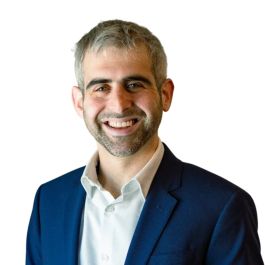When Mark Bacon walks down the simmering streets of Houston, he doesn’t just see buildings.
Instead, he sees LED lights glowing inside, rooftop chiller units humming and double-pane windows holding off the Texas heat — the minutia of energy-saving details at work for the businesses inside.
“I can’t walk by a building now and not notice the details,” said Bacon, who is a practice lead of energy incentives at Leyton. “These efficiencies, or inefficiencies, are all around us, and we never really think about them.”
Invisible in plain sight, the energy-saving industry is a quickly blooming space with direct application to real-world problems, said Bacon.
As someone who pivoted from a “wildly abstract” degree in chemistry and early sales career in the oil industry into a technical role with Leyton, Bacon has found incredible potential for tangible impact.
“Someone I know once described careers as a portfolio versus a path,” Bacon said. “I love visualizing the different skills I’ve gained over the years as a portfolio of expertise that’s prepared me for this role.”
After garnering a decade of sales experience, Bacon made a self-described 180, shifting from fossil fuel to energy efficiency. He found that his daily interactions with buildings made the content easier and more exciting to grasp. “I wish I had done it earlier,” he said.
Since his exodus from oil, he has trained as an engineer in the energy space. At Leyton, he’s dedicated his time to articulating the series of government deductions and credits designed to bolster energy efficiency in the United States.
“When I started, these deductions weren’t yet a permanent part of the tax code,” Bacon said, laughing. “I often worried about losing my job — but I’ve done this long enough that I’ve seen it become not only permanent but one of the fastest-growing job markets in the country.
“This work is hugely impactful and important,” he added. “It can’t be ignored.”
Benjamin Kluwgant, a state and local tax consultant agrees. On its face, tax incentives might sound drab, but the potential for enacting change is thrilling.
“Working in the space of government incentives is extraordinarily exciting,” he said. “We’re empowering businesses to access funding to achieve their aspirations.”
Working in the space of government incentives is extraordinarily exciting. We’re empowering businesses to access funding to achieve their aspirations.”
Government incentives can unlock sustainable hypergrowth, which otherwise lies latent beneath out-of-pocket payments and debt, Kluwgant said. At Leyton, sustainability possesses an exciting duality.
“There’s a sustainability component in terms of energy but also in sustainable business practices,” he said.
Like Bacon, Kluwgant took a roundabout path to Leyton, working as a journalist and salesperson prior to arriving in the energy space. Kluwgant’s portfolio of skills has made him an end-to-end expert, developing sales narratives while supporting consultants in quality control.
Long story short: nobody starts their career in energy efficiency, Bacon chimed in. “Ben Kluwgant did not start out of college ready to take on state and local taxes; I did not come out of college thinking, ‘I’m gonna do energy efficiency,’” said Bacon.
In this hidden career path lies the opportunity to put down professional roots and affect unparalleled change, Kluwgant added.
“The ability to help businesses navigate the complexities of bureaucracy to access funding is something that will never go away,” he said. “We get to watch people grow and the economy evolve from the inside out.”
WHAT LEYTON DOES
Leyton is a consultancy firm with a unique goal: to quickly improve the financial performance of its clients without impacting their core business. Its specific U.S. expertise is in the implementation and optimization of research and development tax credits, the Employee Retention Credit , state and local tax credits and energy efficiency credits. “Simply put, we provide tax consulting through the use of industry expertise and cutting-edge technology to help businesses access funds that drive sustainable performance,” said Kluwgant.

‘Worth Our SALT’
From dubbing consultants as “consaltants,” to driving “resalts,” SALT puns abound at Leyton, said Kluwgant.
“We have to make sure we’re worth our salt,” he said, laughing.
SALT is an acronym for state and local taxes — a complex web of rules, regulations and nuances that vary from state to state. There are tax codes encompassing sales, income and employment taxes, there are federal and regional stipulations — all made more complex in the wake of the pandemic.
“What we do is empower businesses to traverse the complex landscape of multistate taxability — ensuring businesses are neither overpaying nor missing out on incentives,” said Kluwgant.
Kluwgant and his colleagues strive to identify, demystify, rectify and maintain, he summarized.
This work interfaces with Bacon’s efforts on the energy efficiency side of the business, where the Inflation Reduction Act is a daily point of conversation. Introduced in 2022, the act aims to mitigate runaway inflation by reducing deficit — lowering prescription drug prices and investing heavily in clean energy.
“It’s given U.S. companies an advantage they didn’t have before,” said Bacon.
“These stateside companies account for 30 to 40 percent of energy use,” Bacon continued. “We need to drive efficiency there.”
In the intersection between burgeoning energy concerns and nuanced tax regulations lies the crux of Leyton’s work. Emerging from the pandemic and into an inflation-riddled but energy-conscious economy, the best is yet to come, he said.

Filling the Knowledge Gap
“Just this morning, I was pondering the right way to hire in this industry,” Bacon said candidly. “There’s a knowledge gap at work.”
In this void, Bacon doesn’t see a problem; rather, he sees a lacuna for an emerging industry.
“At Leyton, we’re lucky to have experienced team members who are eager to train up-and-coming professionals,” he said. “We have the capacity to accelerate the growth of those who are stepping into the space.”
Bacon likened a few years at Leyton as equivalent to a decade of experience in slower-moving fields. Kluwgant nodded in agreement.
“We invest heavily in learning and development,” he said. “People are the product here — our people are the ones guiding businesses through incentives, growth and beyond.”










